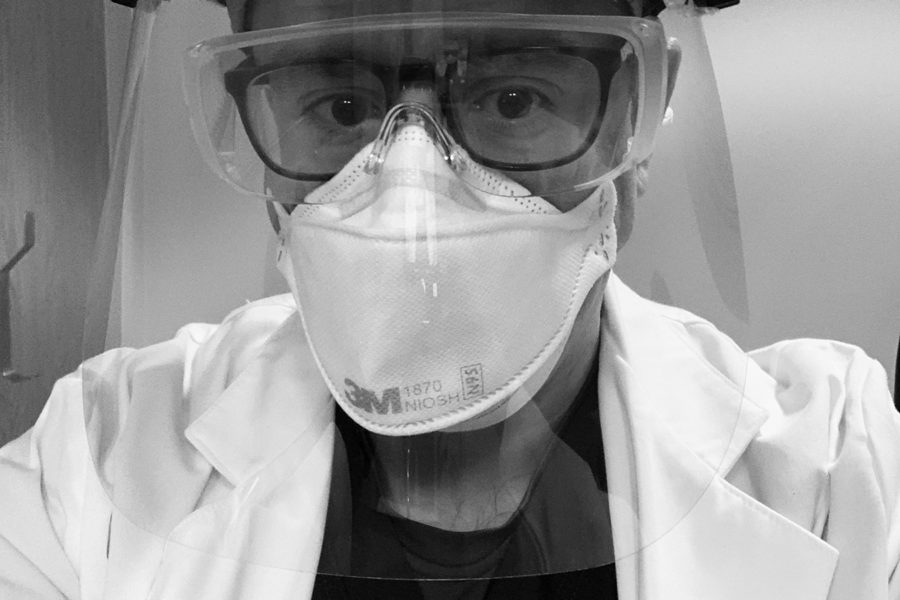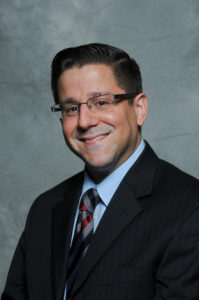
Dominic J. Valentino III, DO, FCCP, FACOI
In March 2020, as the COVID-19 pandemic surged throughout the tri-state region, Dominic J. Valentino III, DO, FCCP, FACOI, sprang into action. Board-certified in internal medicine, critical care, pulmonary and sleep medicine, Valentino was needed on the front lines. Before the pandemic, a good deal of his time was spent in outpatient and inpatient pulmonary and sleep medicine, with about one week a month in the Intensive Care Unit (ICU) at a large health care system in Delaware.
With the explosive growth of the ICU population from late March through late May, most of Valentino’s responsibilities were diverted to treating patients with COVID. “We ramped up focus in the ICU,” Valentino explained, giving credit to the health care system’s ability to step up and react to the sudden changes. “We had very strong medical leadership that was inclusive of our thoughts. We adapted models to care for patients in a way that made sense and utilized the rapidly evolving science around it.”
He and his colleagues examined what was happening in Europe and China as well as Seattle, Washington—the first area in the United States to treat COVID patients—to prepare as best as possible.
And while many in the region were confined to their homes in lockdown mode, confused and afraid of the unfolding, surreal scenario that felt like a science fiction movie in real-time, fear was never an emotion that this seasoned physician experienced. “This is what I do,” said Valentino. “It’s what I signed up for.” In fact, Valentino knew—since he was in high school—that he wanted to be a doctor. “When I was a kid, I was sick a lot with asthma,” shared Valentino. “I had doctors who were really good role models.”
In addition, the South Jersey resident always liked to think things through, to solve problems. A career in medicine seemed like a natural calling.

Valentino
“I was never afraid,” said the 47-year-old physician who described the pandemic’s arrival as a tidal wave. “I made a conscious decision when this started that I wasn’t going to approach this with fear but rather with respect.”
In truth, Valentino elaborated, as a critical care physician, he and his colleagues had been training and preparing for something like this for years. At the time of the Ebola outbreak in 2014, he underwent specialized training.
Valentino, who previously directed an ICU in Delaware County, Pennsylvania for a decade, is also a clinical associate professor of medicine at Philadelphia College of Osteopathic Medicine and a clinical adjunct assistant professor of medicine at Drexel University College of Medicine.
A Philadelphia native and the married father of three boys, Valentino was fully aware that a pandemic of this nature could occur. “It was always something on the radar,” he said. “You never know what it’s going to be or how.” Even though we are living in uncertain times, Valentino chooses to focus on moving forward. He described his mindset throughout the height of the crisis as “a reassurance that we were rowing in the right direction.”
The last six months or so have also been about sharing scientific facts and assuaging fears. Back in March, Valentino couldn’t help but observe the mixed messages and misinformation spreading on social media as well as large-scale media outlets. So, the writer/communicator in him kicked in. Valentino always enjoyed writing and was a dual major in Biology and English as an undergraduate at LaSalle University. One day in late March, he sat down and wrote a post on his Facebook page (Dom Val). It was written from his personal perspective and experience managing COVID patients. He intended to share updated medical information, clear up misinformation and debunk myths and inaccuracies. “It was a way to use social media for something useful,” said Valentino. “I approach COVID topics in a way that is non-political and based on science and evidence as it is evolving.” What he never expected was the enormity of responses and feedback. “People told me how helpful the posts were,” recalled Valentino, who then named them “From the Trenches.” He continues to share medical information and updates about every other week. Today, “From the Trenches” has over 5,000 followers. Clearly, an unintended outcome.
With such overwhelmingly positive feedback from family, friends and the general public, Valentino’s presence on social media was no secret. It was then that Harris Cohen, M.D., a Philadelphia area family medicine primary care physician, reached out suggesting they collaborate to launch a podcast. The two had never met but had mutual friends and colleagues. The idea was to choose COVID-19 related topics impacting the community and answer the ever-growing pool of questions and concerns. At first, Valentino was hesitant to partake in any type of broadcast. “I didn’t want to be just another talking head,” he said. But after thinking it through, he decided it could prove an invaluable resource.
“Between Two Docs” was initially broadcast in May on a weekly basis in video format on Facebook and as a podcast on Facebook and iTunes. As the number of COVID-19 cases declined in the region, the 30-minute program changed to about once every three weeks. “The content includes news updates and interviews with people from all walks of life on how COVID has affected them,” said Valentino. “We’ve been getting over 4 to 5,000 views per week.” Viewers submit questions prior to each program. Recent programs featured a panel of teachers with thoughts on back to school issues and an interview with a social worker/psychotherapist.
Admittedly, we are still living in a pandemic. Yet, noted Valentino, we’ve come a long way since March. And if we compare this historic pandemic to the Spanish flu of 1918, Valentino is quick to point out that we have significant advances in medical and scientific technology that did not exist a century ago.
In the early weeks of COVID-19, Valentino said mortality rates in the ICU at most major health care systems were upwards of 65 to 80 percent. Today, the rate is about 25 to 35 percent. “The well of knowledge is growing deeper,” he said. And in recent weeks, there have been a number of new testing methods and treatment modalities.
Although there is no cure for COVID-19, Valentino said treatment options are better at the outpatient level and a variety of new therapies—such as the steroid Dexamethasone—are being introduced earlier in the disease. Medical professionals have become more successful with intervention and preventing cases from escalating to critical care.
Contrary to popular belief, Valentino doesn’t necessarily think that this fall’s flu season will be as bad as many are predicting. “We are doing so much more now than we ever did,” said Valentino, citing examples of social distancing, wearing masks, hand hygiene and heightened sanitizing and prevention measures. He also isn’t convinced that there will be a second wave of COVID-19. “It’s certainly a possibility, which we prepare for, but not a given,” he said.
People have asked whether COVID-19 will mutate. “It already has shown the ability to mutate,” said Valentino, adding that he believes the virus will likely stay with us in the future but doesn’t think it will cause catastrophic illness as it did when it first appeared.
Valentino elaborated: “Coronaviruses have been around for many years and will continue to be here. They’re naturally occurring in the environment; there are five or six strains that cause the common cold.”
The significant progress with vaccine trials has given Valentino reason for hope and reassurance. “There are about four or five vaccine trials worldwide now in Phase 3,” he said. “The fear factor will be diminished once we have a vaccine.”
Some have called the pandemic life-changing and feel things will never return to “normal.” Valentino acknowledges that COVID-19 has altered our lives on multiple levels. Yet, he believes that when a vaccine is available – schools, businesses, professional sports, etc. will get back to some semblance of normalcy, albeit one that may be different than what existed in the past. “We’re still going to need to use what we learned in the last few months,” said Valentino, hoping people will be mindful that applied science will better prepare us for the future while minimizing fear and uncertainty.

